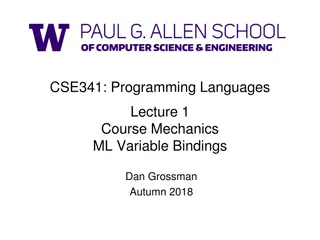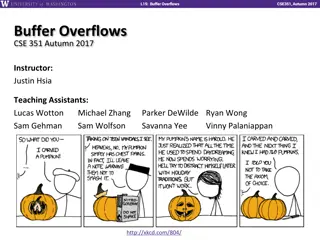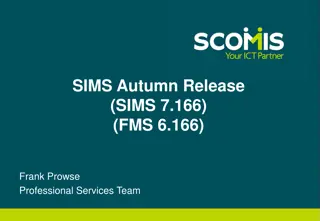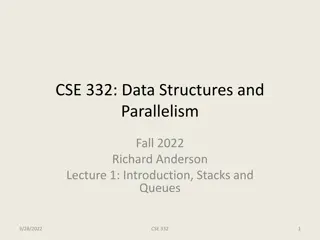CSE 332 Autumn 2023
Explore the nuances of parallel programming, from the shift away from sequential processing to the benefits of parallelism and concurrency. Discover the reasons behind the rise of multi-threaded computation and the challenges and opportunities it presents. Delve into the new story of code execution and how multiple processors collaborate to enhance computing speed.
Download Presentation

Please find below an Image/Link to download the presentation.
The content on the website is provided AS IS for your information and personal use only. It may not be sold, licensed, or shared on other websites without obtaining consent from the author.If you encounter any issues during the download, it is possible that the publisher has removed the file from their server.
You are allowed to download the files provided on this website for personal or commercial use, subject to the condition that they are used lawfully. All files are the property of their respective owners.
The content on the website is provided AS IS for your information and personal use only. It may not be sold, licensed, or shared on other websites without obtaining consent from the author.
E N D
Presentation Transcript
CSE 332 Autumn 2023 Lecture 20: ForkJoin Nathan Brunelle http://www.cs.uw.edu/332
A Programming Assumption Reconsidered So far: Programs run by executing one line of code at a time in the order written Called Sequential Programming Removing this assumptions creates challenges and opportunities Programming: Divide computation across several parallel threads, then coordinate (synchronize) across them. Algorithms: This parallel processing can speed up computation by increasing throughput (operations done per unit time) Data Structures: May need to support concurrent access (multiple parallel processes attempting to use it at once)
Why Parallelism? Pre 2005: Processors naturally got faster at an exponential rate (~2x faster every ~2 years) Since 2005: Some components cannot be improved in the same way due to limitations of physics Solution: increase computing speed by just adding more processors
What to do with the extra processors? Time Slicing: Your computer is always keeping track of multiple things at once running the OS, rendering the display, running Powerpoint, autosaving a document, etc. Multiple processors allow for the multiple tasks to be spread across them, so each processor dedicates more time to each one Parallelism (our focus): Multiple processors collaborate on the same task.
Parallelism Vs. Concurrency (with Potatoes) Sequential: The task is completed by just one processor doing one thing at a time There is one cook who peels all the potatoes Parallelism: One task being completed by may threads Recruit several cooks to peel a lot of potatoes faster Concurrency: Parallel tasks using a shared resource Several cooks are making their own recipes, but there is only 1 oven
New Story of Code Execution Old Story: One program counter (current statement executing) One call stack (with each stack frame holding local variables) Objects in the heap created by memory allocation (i.e., new) (nothing to do with data structure called a heap) New Story: Collection of threads each with its own: Program Counter Call Stack Local Variables References to objects in a shared heap
Old Story Heap Containing Objects and Static Fields Call Stack Program Counter Local Variables (primitives and references to Heap objects)
New Story Heap Containing Objects and Static Fields Threads, each with its own unshared: Call Stack Program Counter Local Variables (primitives and references to Heap objects)
Needs from Our Programming Language A way to create multiple things running at once Threads Ways to share memory References to common objects Ways for threads to synchronize For now, just wait for other threads to finish their work
Parallelism Example (not real code) Goal: Find the sum of an array Idea: 4 processors will each find the sum of one quarter of the array, then we can add up those 4 results int sum(int[] arr){ res = new int[4]; len = arr.length; FORALL(i=0; i < 4; i++) { //parallel iterations res[i] = sumRange(arr,i*len/4,(i+1)*len/4); } return res[0]+res[1]+res[2]+res[3]; } int sumRange(int[] arr, int lo, int hi) { result = 0; for(j=lo; j < hi; j++) result += arr[j]; return result; } Note: This FORALL construct does not exist, but it s similar to how we ll actually do it.
Java.lang.Thread To run a new thread: 1. Define a subclass C of java.lang.Thread, overriding run 2. Create an object of class C 3. Call that object s start method start sets off a new thread, using runas its main Calling run directly causes the program to execute run sequentially
Back to Summing an Array Goal: Find the sum of an array Idea: 4 threads each find the sum of one quarter of the array Process: Create 4 thread objects, each given a portion of the work Call start() on each thread object to run it in parallel Wait for threads to finish using join() Add together their 4 answers for the final result + + + + +
First Attempt (part 1, defining Thread Object) class SumThread extends java.lang.Thread { int lo; // fields, assigned in the constructor int hi; // so threads know what to do. int[] arr; int ans = 0; // result SumThread(int[] a, int l, int h) { lo=l; hi=h; arr=a; } public void run() { //override must have this type for(int i=lo; i < hi; i++) ans += arr[i]; }
First Attempt (part 2, Creating Thread Objects) class SumThread extends java.lang.Thread { int lo, int hi, int[] arr; // fields to know what to do int ans = 0; // result SumThread(int[] a, int l, int h) { } public void run(){ } // override } int sum(int[] arr){ // can be a static method int len = arr.length; int ans = 0; SumThread[] ts = new SumThread[4]; for(int i=0; i < 4; i++) // do parallel computations ts[i] = new SumThread(arr,i*len/4,(i+1)*len/4); for(int i=0; i < 4; i++) // combine results ans += ts[i].ans; return ans; }
First Attempt (part 3, Running Thread Objects) class SumThread extends java.lang.Thread { int lo, int hi, int[] arr; // fields to know what to do int ans = 0; // result SumThread(int[] a, int l, int h) { } public void run(){ } // override } int sum(int[] arr){ // can be a static method int len = arr.length; int ans = 0; SumThread[] ts = new SumThread[4]; for(int i=0; i < 4; i++){ // do parallel computations ts[i] = new SumThread(arr,i*len/4,(i+1)*len/4); ts[i].start(); // start not run} for(int i=0; i < 4; i++) // combine results ans += ts[i].ans; return ans; }
First Attempt (part 4, Synchronizing) class SumThread extends java.lang.Thread { int lo, int hi, int[] arr; // fields to know what to do int ans = 0; // result SumThread(int[] a, int l, int h) { } public void run(){ } // override } int sum(int[] arr){ // can be a static method int len = arr.length; int ans = 0; SumThread[] ts = new SumThread[4]; for(int i=0; i < 4; i++){ // do parallel computations ts[i] = new SumThread(arr,i*len/4,(i+1)*len/4); ts[i].start(); // start not run} for(int i=0; i < 4; i++) // combine results ts[i].join(); // wait for thread to finish! ans += ts[i].ans; return ans; }
Join Causes program to pause until the other thread completes its run method Avoids a race condition Without join the other thread s ans field may not have its final answer yet
Different machines have different numbers of processors! Flaws With this Attempt Making the thread count a parameter helps make your program more efficient and reusable across computers int sum(int[] arr, int numTs){ // can be a static method int len = arr.length; int ans = 0; SumThread[] ts = new SumThread[numTs]; for(int i=0; i < numTs; i++){ // do parallel computations ts[i] = new SumThread(arr,i*len/numTs,(i+1)*len/numTs); ts[i].start(); // start not run} for(int i=0; i < numTs; i++) // combine results ts[i].join(); // wait for thread to finish! ans += ts[i].ans; return ans; }
Flaws With this Attempt Even If we make the number of threads equal the number of processors, the OS is doing time slicing, so we might not have all processors available right now For some problems, not all subproblems will take the same amount of time: E.g. determining whether all integers in an array are prime.
One Potential Solution: More Threads! Identify an optimal workload per thread E.g. maybe it s not worth splitting the work if the array is shorter than 1000 Split the array into chunks using this sequential Cutoff numTs = len/SEQ_CUTOFF; Problem: One process is still responsible for summing all len/1000 results Process is still linear time
A Better Solution: Divide and Conquer! Idea: Each thread checks its problem size. If its smaller than the sequential cutoff, it will sum everything sequentially. Otherwise it will split the problem in half across two separate threads.
5 8 2 9 4 1 Merge Sort Base Case: If the list is of length 1 or 0, it s already sorted, so just return it 5 Divide: Split the list into two sublists of (roughly) equal length 5 8 2 9 4 1 Conquer: Sort both lists recursively 2 5 8 1 4 9 Combine: Merge sorted sublists into one sorted list 2 5 8 1 4 9 1 2 4 5 8 9 22
5 8 2 9 4 1 Parallel Sum Base Case: If the list s length is smaller than the Sequential Cutoff, find the sum sequentially 5 5 8 2 Divide: Split the list into two sublists of (roughly) equal length, create a thread to sum each sublist. 9 4 1 ans=15 Conquer: Call start() for each thread ans=14 Combine: Sum together the answers from each thread ans=29 23
Divide and Conquer with Threads class SumThread extends java.lang.Thread { public void run(){ // override if(hi lo < SEQUENTIAL_CUTOFF) // base case for(int i=lo; i < hi; i++) ans += arr[i]; else { SumThread left = new SumThread(arr,lo,(hi+lo)/2); // divide SumThread right= new SumThread(arr,(hi+lo)/2,hi); // divide left.start(); // conquer right.start(); // conquer left.join(); // don t move this up a line why? right.join(); ans = left.ans + right.ans; // combine } } } int sum(int[] arr){ // just make one thread! SumThread t = new SumThread(arr,0,arr.length); t.run(); return t.ans; }
Small optimization Instead of calling two separate threads for the two subproblems, create one parallel thread (using start) and one sequential thread (using run)
Divide and Conquer with Threads (optimized) class SumThread extends java.lang.Thread { public void run(){ // override if(hi lo < SEQUENTIAL_CUTOFF) // base case for(int i=lo; i < hi; i++) ans += arr[i]; else { SumThread left = new SumThread(arr,lo,(hi+lo)/2); // divide SumThread right= new SumThread(arr,(hi+lo)/2,hi); // divide left.start(); // conquer right.run(); // conquer left.join(); // don t move this up a line why? //right.join(); ans = left.ans + right.ans; // combine } } } int sum(int[] arr){ // just make one thread! SumThread t = new SumThread(arr,0,arr.length); t.run(); return t.ans; }
ForkJoin Framework This strategy is common enough that Java (and C++, and C#, and ) provides a library to do it for you! What you would do in Threads What to instead in ForkJoin Subclass Thread Subclass RecursiveTask<V> Override run Override compute Store the answer in a field Return a V from compute Call start Call fork join synchronizes only join synchronizes and returns the answer Call run to execute sequentially Call compute to execute sequentially Have a topmost thread and call run Create a pool and call invoke
Divide and Conquer with ForkJoin class SumTask extends RecursiveTask { int lo; int hi; int[] arr; // fields to know what to do SumTask(int[] a, int l, int h) { } protected Integer compute(){// return answer if(hi lo < SEQUENTIAL_CUTOFF) { // base case int ans = 0; // local var, not a field for(int i=lo; i < hi; i++) { else { SumTask left = new SumTask(arr,lo,(hi+lo)/2); // divide SumTask right= new SumTask(arr,(hi+lo)/2,hi); // divide left.fork(); // fork a thread and calls compute (conquer) int rightAns = right.compute(); //call compute directly (conquer) int leftAns = left.join(); // get result from left return leftAns + rightAns; // combine } } } ans += arr[i]; return ans; }
Divide and Conquer with ForkJoin (continued) static final ForkJoinPool POOL = new ForkJoinPool(); int sum(int[] arr){ SumTask task = new SumTask(arr,0,arr.length) return POOL.invoke(task); // invoke returns the value compute returns }
Section Tomorrow Working with examples of ForkJoin Make sure to bring your laptops! And charge it!























